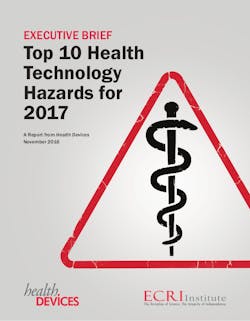Testing frequency of automated washers; scope moisture identification
Submit your questions
email: [email protected]
phone: (941) 927-9345 ext. 202
Q I am the nurse manager for quality assurance practices and education for surgical services, which includes sterile processing. I am in the process of reviewing and revising the quality assurance practices for the cleaning process to comply with the best practices. I am conflicted by the different recommendations for monitoring the efficacy of automated instrument washers. AORN recommends weekly testing of washers and AAMI now recommends daily testing of all automated processing equipment. We currently are following the AORN recommendation for weekly testing which has worked well for us. Changing our practice to daily testing of all automated washers would increase our budget line by $25,000 per year. I find it hard to justify such an increase when I can stick with AORN recommendations which have kept us in compliance with professional practice recommendations. What are your thoughts on dealing with such conflicts? Is my rationale of sticking with AORN recommendations and avoiding unnecessary expenditures sound?
A In reading your question I noticed that your goal is to revise the quality assurance practices for the cleaning process to comply with “best practices.” Regarding the monitoring and testing of automated washers, the current AORN recommendation actually states that mechanical cleaners (e.g., washer disinfectors/decontaminators) should be tested for correct function on installation, and at least weekly (preferably daily). It appears clear to me that “preferably daily” would be interpreted as the best practice. The AAMI standard was revised to daily testing in the summer of 2017 and previously read the same as the current AORN recommendation. AORN does have representation and voting rights on AAMI. In fact, an AORN representative was the co-chair of the AAMI ST79 committee which produced the new standard.
The AORN recommendation regarding this matter will be up for review and revision in the near future and I am quite certain that it will parallel the AAMI standard of daily testing. I am sure that you are well aware of the many well-publicized articles that have identified cleaning failures as a key cause of serious nosocomial infections, which have resulted in adverse patient-care outcomes, including deaths. Many failures in reprocessing and cleaning have been linked to mechanical washer failures and/or improper use. The testing and monitoring of this critical equipment could have identified performance failures. As a quality assurance professional you are responsible to ensure that policies and procedures are in place that will provide the safest and best practices for protecting patients and fellow healthcare workers from the dangerous and life–threatening outcomes associated with process equipment failures, which are preventable. A weekly test of washers does not ensure that the equipment has effectively functioned each day. This can only be verified by daily testing. There are some facilities that have actually implemented testing of each cycle.
Q We recently went through a mock survey in preparation for a pending Joint Commission accreditation inspection. A primary focus was placed on the reprocessing and handling of endoscopes. The surveyor found many areas with wetness on the bottom of the scope storage cabinets which she said indicated that the scopes were not dried adequately. She stated that this was a major violation and that moisture retained in scope channels has been identified as a breeding ground for bacteria and linked to many patient infections. I have been ordered to remedy this issue and to implement a protocol to ensure that all scopes are completely dried prior to being placed in storage. We have developed and implemented check lists to verify that processing procedures are being followed which includes drying. The instrument channels are air-flushed. In spite of this, apparently some moisture must be trapped in the channel and drain out in storage. What can I do to remedy this problem?
A The issue of inadequately dried channels has been identified as a very serious issue affecting many facilities. You are not alone in confronting this matter. The issue is severe enough that surveyors are indeed taking a very close look at scope reprocessing and drying practices. Your check list sounds like a wonderful idea and hopefully correlates precisely to specific scope manufacturer’s IFUs, including the drying instructions. You mentioned that you are air-flushing the instrument channel, what about the other channels or ports that could retain moisture e.g., biopsy channel, auxiliary water inlet, suction connection, etc.? I am aware of at least one simple test, which is on the market to detect channel moisture retention (see figure 1). The test is a color card which is a solid color, pre-test or post-test if no moisture is detected. After drying the endoscope, in accordance with the manufacturer’s instructions, each channel in sequence is flushed with the same air source that was used for drying the scope. The air is blown on to the colored test card and if any white spots appear on the test card it indicates that the scope has not been adequately dried (see figure 2). The testing would continue with a new test card until there is no evidence of moisture.
About the Author

Ray Taurasi
Ray Taurasi is Principal, Healthcare CS Solutions. His healthcare career spans over five decades as an Administrator, Educator, Technologist and Consultant. He is a member of AORN, SGNA, AAMI and a past president of IAHCSMM. Taurasi has been a faculty member of numerous colleges teaching in the divisions of business administration, nursing, and health sciences. He is the author of numerous articles and textbook chapters; he is a frequent speaker at national and international healthcare conferences.
Note to readers from Ray Taurasi - In 2021, my life’s career path will transition to one of new opportunities and adventures. As a result, after nearly 19 years and 225 CS Solution columns, this edition will be my last.
“All changes, even the most longed for, have their melancholy; for what we leave behind us is a part of ourselves; we must die to one life before we can enter another.”– Anatole France
I wish you and your loved ones a healthy and joyful holiday season and a beautiful New Year! God Speed, Ray
https://www.facebook.com/pages/category/ Local-Business/Healthcare-CS-Solutions-128857 3061153887/ • email: [email protected]


